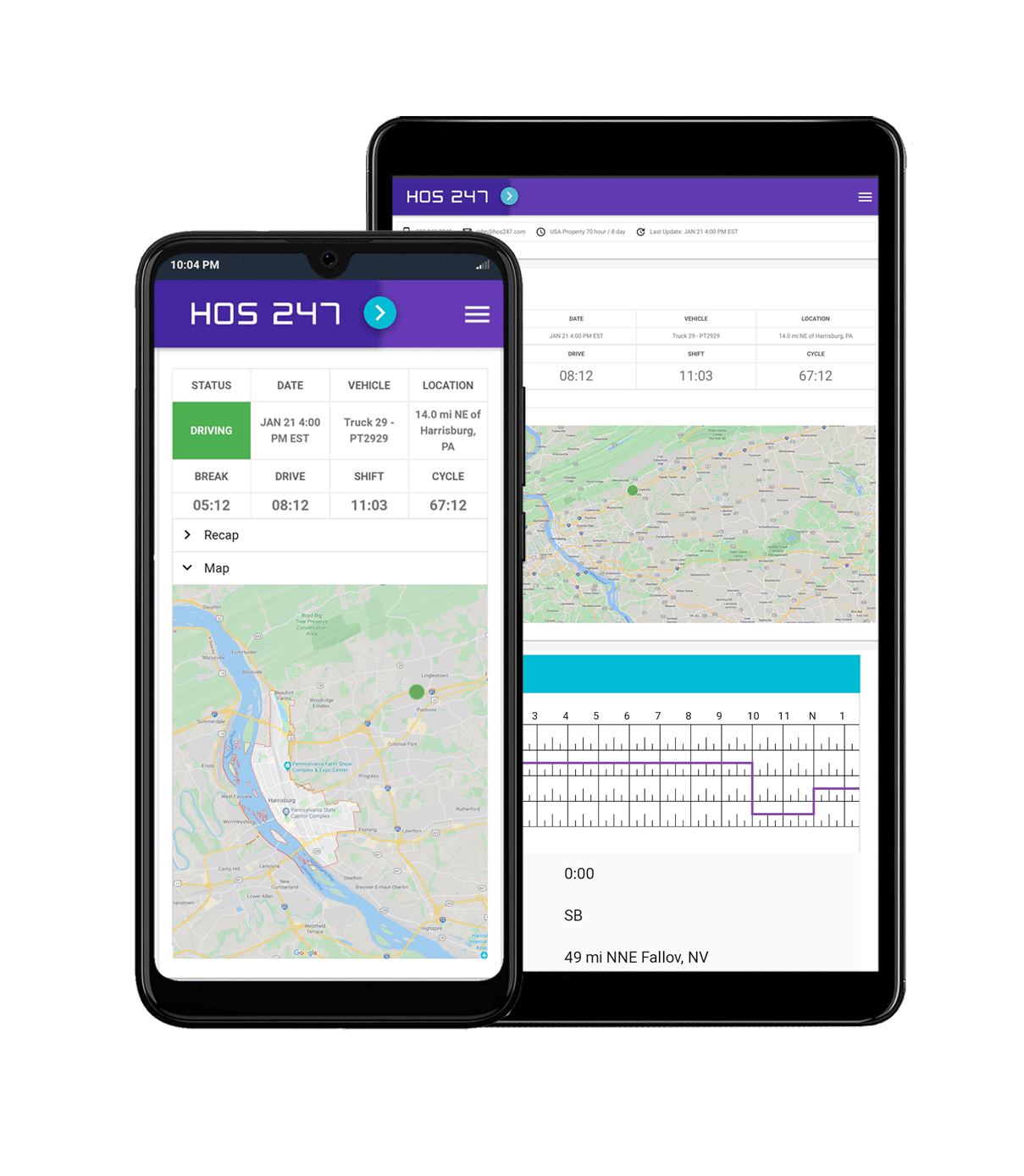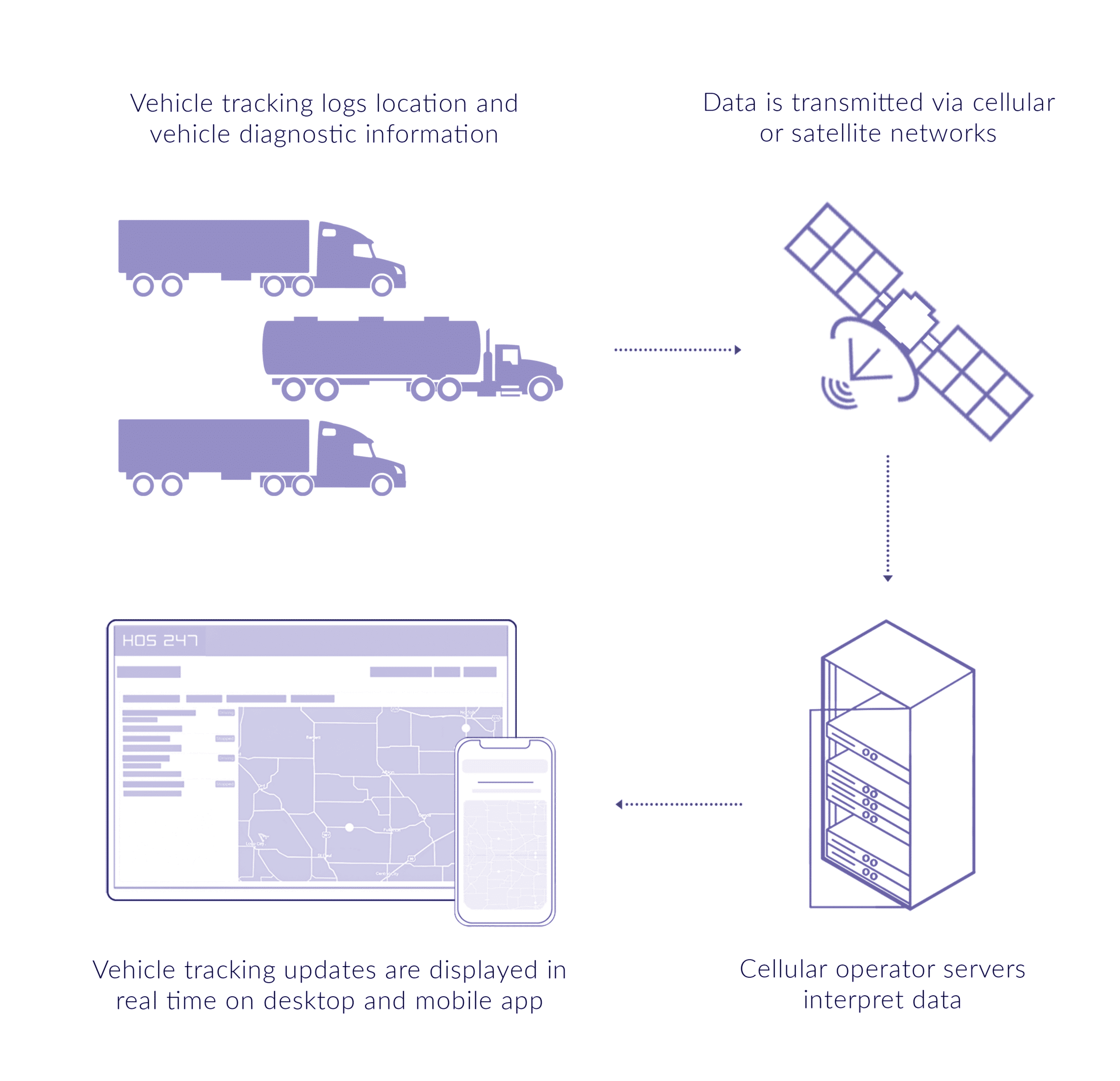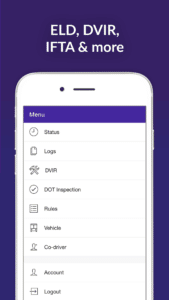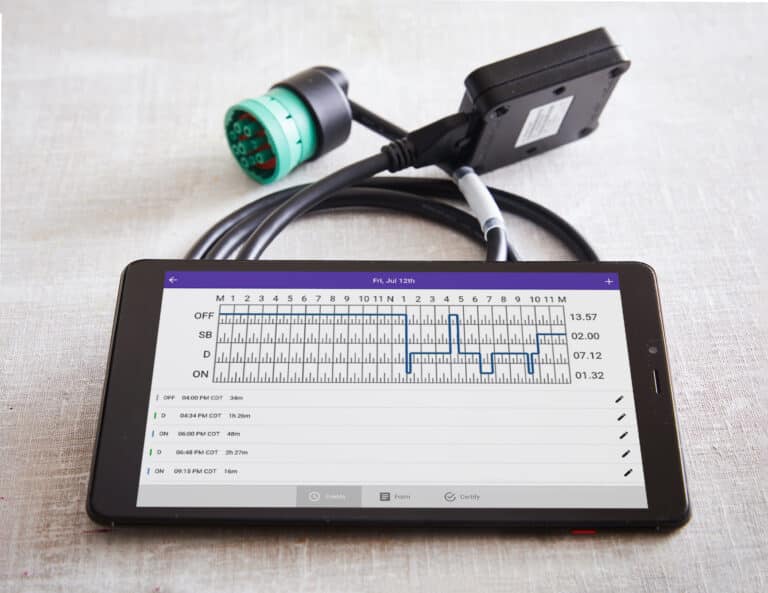Running a business is challenging, no matter the size. Just like giant companies with hundreds of vehicles in operation, owners of small fleets face similar problems related to inefficient dispatch, lack of visibility, extra fuel expenses, and time-consuming paperwork.
Small fleet GPS tracking can give smaller carriers an advantage by helping them cut operational costs and optimize their workflow, ultimately increasing profitability. In this article, we will discuss the benefits of GPS for small fleets and how HOS247 can help.
Do you have any questions? Talk to ELD Advisor: 650-405-3372 or Request Callback
Advantages of Using a Small Fleet GPS Tracking System
GPS tracking systems offer numerous benefits to small fleet carriers and managers. Besides providing accurate vehicle tracking, a reliable GPS tracker helps reduce road accidents, save on fuel consumption, prevent delays in deliveries, track and recover lost vehicles, lessen maintenance and insurance costs and gain overall control over operations. Let’s examine the main advantages of GPS fleet tracking.

Get Full Fleet Visibility by Tracking Your Vehicles in a Real-Time
GPS fleet tracking uses telematics to accurately track vehicle location and send this data to fleet managers in real-time, improving dispatch operations and communication between drivers and the office. Fleet managers no longer need to make regular phone calls to check in with drivers as they will have real-time visibility of their locations.
Ensure Your Fleet Security with Hidden GPS Trackers
GPS trackers can be concealed and send real-time alerts to the fleet manager portal if the vehicle is taken to an unauthorized location or gets into an accident. These devices will track the vehicle even if it is turned off, helping recover assets in case of theft.
Cut Fuel Expenses
GPS trackers identify drivers’ behavior, such as idling, excessive acceleration, and hard braking, and notify fleet managers via the web-based portal. This information allows supervisors to take action and improve drivers habits on the road, cutting fuel expenses and reducing the company’s carbon footprint. Maintenance reminders provided by the system based on vehicle mileage also contribute to more efficient fuel use by keeping vehicle’s in top shape.
Expand Vehicles’ Useful Life
Proper vehicle maintenance is crucial for fleet longevity and operational efficiency. GPS tracking systems integrated with fleet management software help schedule preventative maintenance by monitoring mileage, engine hours, and diagnostic trouble codes. Automated alerts notify managers and drivers about necessary servicing, reducing the risk of unexpected breakdowns and costly repairs. By proactively addressing maintenance needs, fleet operators can extend vehicle life, optimize fuel efficiency, and minimize downtime.
Improved Customer Satisfaction
Timely deliveries and efficient operations are key factors in customer satisfaction. A GPS-enabled fleet management system enhances dispatch efficiency by optimizing routes and reducing delivery delays. Real-time tracking allows businesses to provide accurate ETAs and improve communication with clients. Additionally, improved vehicle maintenance reduces the likelihood of mechanical failures that could disrupt services. A well-managed fleet leads to greater reliability, ultimately strengthening customer relationships and improving business reputation.
Choosing the Right GPS Tracking System for Your Fleet
Selecting the best GPS tracking system is a critical decision for fleet operators. The right solution should align with business needs and offer a balance between cost and functionality. Below are key factors to consider:
- Fleet size and business needs. Different fleets have varying operational requirements. A small fleet may need basic tracking and compliance features, while a larger fleet could benefit from advanced analytics, route optimization, and asset tracking. Choosing a system tailored to fleet size and operational goals ensures maximum efficiency.
- Ease of use and integration. A GPS tracking system should be user-friendly and seamlessly integrate with existing fleet management software. Systems with intuitive dashboards and mobile compatibility help drivers and dispatchers easily access critical information and streamline operations.
- Pricing and ROI considerations. While affordability is important, the cheapest option is not always the best. Evaluate the system’s long-term benefits, such as fuel savings, maintenance cost reductions, and operational efficiency, to ensure a solid return on investment.
- Customer support and reliability. A dependable GPS provider should offer strong customer support, including troubleshooting assistance, software updates, and a responsive technical team. Checking user reviews and provider reliability can help fleet managers make an informed decision.
Selecting the right GPS tracking system is a crucial investment for your fleet’s efficiency and long-term success. By evaluating your business needs, ensuring seamless integration, considering cost-effectiveness, and prioritizing reliable customer support, you can choose a solution that enhances operations and maximizes profitability. A well-matched GPS tracking system will not only improve fleet visibility and compliance but also contribute to safer, more cost-efficient transportation.
How HOS247 4G Trackers Will Benefit Your Business
HOS247 is a reliable trucking solution provider with years of experience. Our trackers are dependable, don’t require special installation and can be set up within 10 minutes with the help of our practical manual and efficient technical support.
The HOS247 small fleet GPS tracking helps cut down on operational costs related to increased usage of fuel and vehicle repairs. Real-time tracking allows dispatchers to manage trucks more efficiently, choosing the fastest routes and keeping clients informed about the precise delivery time, which results in improved customer service.

Another perk of our real time vehicle location tracking is enhanced security of the fleet. Here is a quick look at our system’s features.
- Vehicle maintenance. Tracking vehicle maintenance schedules on paper can be a challenge. HOS247 trucking software for small fleets eliminates this issue by monitoring vehicles and notifying managers and drivers about upcoming:
- License renewals.
- Warranty expirations.
- Tire rotations.
- Oil changes.
- Maintenance routines.
- Fault code detection. When the diagnostics system of a vehicle notices a malfunction, it generates a trouble code, alerting drivers through an indicator or warning light and fleet managers through the online portal. These codes are also known as diagnostic trouble codes, and they allow fleet managers to take appropriate and timely action to have the vehicle running properly.
- Automated idle tracking. Idle tracking can make a massive difference in reducing fuel wastage. Fleet managers can determine if their operators are prone to unfavorable driving behavior. This data will allow supervisors to use their fuel efficiently, making sure trucks are not idle and do not over speed. Small fleet GPS tracking software helps determine how much time drivers spend idling, allowing managers to take action.
Truckers need various tools to comply with road regulations, ensure vehicle security, reduce paperwork and optimize their processes. At HOS247, we are familiar with all these needs, which is why we offer an all-in-one small fleet management solution with integrated ELD and IFTA reporting that will considerably improve the efficiency of your fleet:
- Electronic logbook. HOS247 offers its electronic logging device solution to provide trucking companies a reliable way to comply with the ELD mandate. RODS management is straightforward and the interface is user-friendly to facilitate proper use.
- IFTA calculations. With this feature companies can automate their IFTA fuel tax reporting process. HOS247’s system calculates the distance traveled by jurisdiction to eliminate possible errors in manual calculations and save time.
Although GPS trackers are not required by law, these devices facilitate truckers’ work routines, boosting operational efficiency and overall productivity of drivers, supervisors, and dispatchers. On the other hand, the ELD mandate obliges motor carriers to install an electronic logbook in their trucks to record hours of service accurately. Let’s talk more about this legislation and how it applies to your small fleet.
HOS247 Customer Care: Putting Clients First
At HOS247, our commitment to customer satisfaction goes beyond providing reliable GPS tracking solutions. We’ve built our service model around the unique needs of trucking professionals with policies designed to deliver peace of mind:

- No long-term contracts. We earn your business through quality service, not contractual obligations. Our month-to-month subscription model gives you the flexibility to adjust your plan as your fleet needs change.
- Multilingual customer support. Our dedicated support team is available 7 days a week in English, Spanish, Russian, and Polish to assist drivers and fleet managers with any questions or technical issues.
- Callback policy. If your call drops during a support conversation, we’ll call you back immediately—a simple courtesy that demonstrates our commitment to resolving your issues promptly.
- One-year hardware warranty. All HOS247 tracking devices come with a comprehensive one-year warranty with free replacement for any defective hardware.
- Two-week trial period. Test our system in real-world conditions with our risk-free trial. If you’re not completely satisfied, returns are hassle-free within this period.
- Regular software updates. We continuously improve our platform based on customer feedback and regulatory changes, ensuring you always have access to the latest features and compliance updates.
Our customer-first approach has earned HOS247 top ratings across multiple review platforms. We understand that in the trucking industry, downtime means lost revenue—that’s why we’ve built our support system to be responsive, knowledgeable, and focused on getting you back on the road quickly.
Implementation and Best Practices for Small Fleet GPS Tracking
Adopting a GPS tracking system requires a strategic approach to ensure successful implementation. Below are best practices for small fleets looking to integrate GPS tracking effectively:
- Training drivers and dispatchers. Proper training ensures drivers and dispatchers can fully utilize GPS tracking features. Hands-on training sessions, user guides, and ongoing support help staff adapt to the new system and maximize its benefits.
- Using data to improve operations. GPS tracking software collects valuable data on routes, fuel usage, and vehicle activity. Fleet managers should analyze these reports to optimize delivery schedules, reduce inefficiencies, and enhance decision-making.
- Regular system updates and maintenance. Keeping GPS tracking software up to date ensures accurate tracking and access to new features. Periodic system maintenance also prevents technical issues that could disrupt fleet operations.
Successfully implementing a GPS tracking system in a small fleet requires careful planning, employee buy-in, and ongoing evaluation. By setting clear goals, training staff, and leveraging data insights, fleet managers can maximize the benefits of their investment. Continuous monitoring and adjustments ensure that the system remains effective, improving operational efficiency, safety, and overall profitability in the long run.
What Are the ELD Mandate Requirements for Small Fleets?
Truckers planning to adopt small fleet tracking solutions may benefit from a solution that also complies with the electronic logging device mandate. The ELD mandate implemented by the FMCSA several years ago intends to ensure road safety, reducing the amount of accidents caused by driver fatigue and organizing HOS information by switching log format from manual to electronic. Its main requirements are:
- The rule requires commercial drivers to use electronic logging devices to prepare records of duty status.
- The ELD mandate sets design and performance standards. It also requires electronic logging devices to be self-certified by the manufacturer and approved by the FMCSA.
- The mandate establishes the supporting documents that carriers and drivers will need to keep.
- It prohibits harassing drivers based on the electronic logging device’s data or the connected technology. In addition, the rule offers recourse for truck drivers who think they were harassed.
At HOS247, we provide carefully developed trucking software for small fleets, making sure they can maintain compliance and avail the various benefits these systems offer.
Benefits of ELDs for Small Fleets
ELDs offer multiple benefits when utilized the right way. These devices can reduce operational costs, streamline operations and significantly increase productivity. Here is a look at some ways ELDs can help your business.
- Reduced administrative burden. Electronic logging devices automatically record drivers’ hours of service by collecting data directly from the engine. Automated processes facilitate operators’ routines and also the work of road officials, as the collected data can be easily transferred to inspectors. ELDs keep track of past records, violations, and driver vehicle inspection reports.
- Lower CSA scores and insurance premiums. Electronic logbooks will notify drivers of possible violations to improve compliance and reduce the chances of fines and penalties. Lower CSA scores mean clients will have a better perception of your business. Improved compliance will also translate into lower insurance premiums.
- Higher productivity. Electronic logging devices help fleet managers have better control of operations and they let dispatchers know driver’s remaining driving hours as well as their location to assign loads more efficiently.

Implementing ELDs in small fleets delivers value beyond mere compliance. These devices reduce administrative workload, improve safety scores, lower insurance costs, and enhance operational efficiency through real-time data insights. For small fleet owners, this technology levels the playing field with larger carriers by providing actionable data on fuel usage, routes, and maintenance needs. As ELDs become more affordable and user-friendly, they represent a smart investment that strengthens competitiveness while ensuring regulatory compliance.
Conclusion
GPS fleet tracking is a valuable investment for small fleets aiming to optimize operations, enhance security, and reduce costs. From real-time tracking to automated maintenance scheduling and compliance support, a reliable GPS system helps businesses streamline workflows and improve customer service. HOS247 offers a comprehensive fleet management solution tailored to the needs of small carriers, providing user-friendly technology, responsive customer support, and long-term benefits. By choosing the right tracking system and implementing best practices, fleet managers can significantly enhance efficiency and profitability.

I’ve co-founded, built and managed several transportation-related businesses. Now, I’m a founder and CEO of HOS247 – an AI Transportation Platform for trucking companies, freight brokers and other logistics operations. We are transitioning old-style operations to technology-advanced logistics entities and help them to grow their businesses. ELDs (electronic logging devices), fleet tracking and management 2.0 combined with AI-powered dispatch tools.












The Federal Motor Carrier Safety Administration requires electronic logging devices (ELDs) to be connected to an engine directly. This allows the ELD to directly record a driver’s hours-of-service (HOS) and records of duty status (RODS) information. Since an ELD app

The ELD mandate, published in 2015 and enforced starting in December 2017, significantly changed how truckers deal with commercial driver log book regulations. Paper logs were replaced by electronic logging devices to record driving activity more accurately by synchronizing directly

GPS fleet tracking is a monitoring system installed in trucks to provide maximum fleet visibility, allowing motor carriers to manage their vehicles in real time. Using telematics technology, GPS fleet tracking hardware collects vehicle-related data and transmits it into the